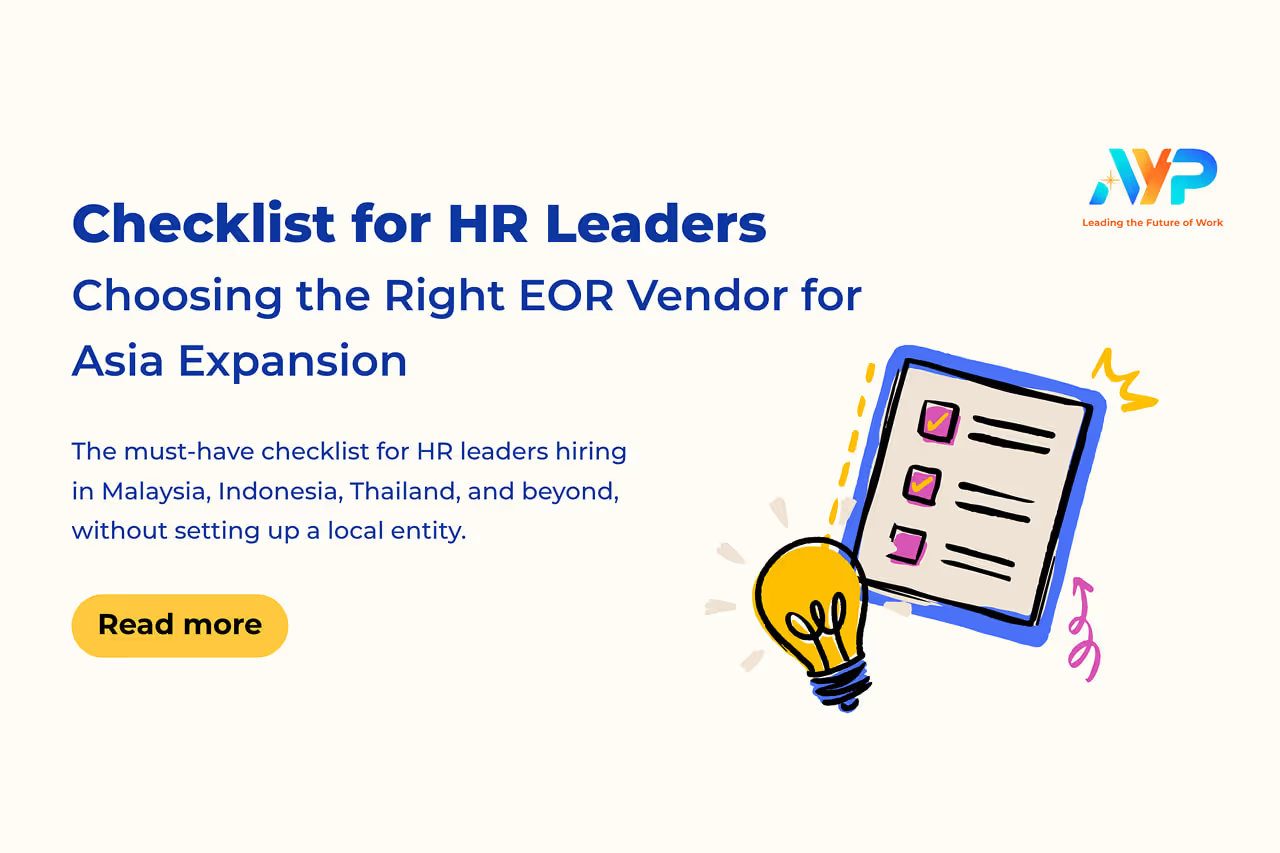BLOG |
Employer of Record & PEO
Published:
November 17, 2025
Last updated:
November 17, 2025


Expanding your team into Asia without establishing a local entity requires deep understanding of each country's labor laws, statutory contributions, and administrative processes. That's where professional employment services can transform complexity into simplicity—allowing you to hire compliantly and swiftly.
Use this comprehensive checklist to evaluate providers, avoid common mistakes, and discover a trustworthy Asia-wide solution.
Each country in Asia enforces mandatory labor contributions:
Malaysia: Employers must pay EPF (Employees Provident Fund) contributions (typically 12%–13%) and SOCSO (Social Security Organisation) contributions (~1.75% employer, 0.5% employee)
Indonesia: BPJS schemes include BPJS Kesehatan (health insurance) and BPJS Ketenagakerjaan covering pension, accident, and unemployment protection. Rates range from 4% employer for health, 3.7% employer + 2% employee for old-age, and others per official regulation (Talent Port)
Thailand: Employers and employees contribute 5% of wages (capped at THB 750/month) to social security; the government adds supplementary funding. Contributions must be submitted by the 15th of the following month.
✅ Ask potential providers:
Your provider should support multiple Asian markets—like Malaysia, Indonesia, Thailand, Vietnam, Taiwan, Hong Kong, and the Philippines—on one unified platform. This avoids vendor fragmentation and simplifies billing, reporting, and support.
✅ Ask:
Speed matters. The best providers enable new hires within days—not weeks—using digital workflows and pre-approved local contract templates.
✅ Ask:
Look for providers offering full-service payroll, benefits compliance, and HR support:
✅ Ask:
Professional employment providers typically need:
✅ Ask:
Transparency is critical:
✅ Ask:
Misclassifying contractors as employees: Risks legal penalties and compliance failure.
Using regional vendors without in-country presence: May lead to outdated or incorrect legal interpretations.
Treating vendor switching as seamless: Contracts, payroll history, and benefits may need manual transfer.
Under-specifying SLAs: Ensure payroll corrections and disputes are resolved within defined timelines.
Yes—registered providers act as the legal employer, compliant under local labor and social security laws.
Generally yes, but check whether employment records, benefits contributions, or local tax ID history can be transferred seamlessly.
Allow 3–5 business days for setup if documentation is ready. Some countries may require additional steps like permits.
Once your checklist is in hand, choosing a partner who matches and elevates expectations is easy. One such provider, AYP, fits the bill for many HR leaders expanding in Asia:
If you're looking for the best professional employment provider for Malaysia or expanding into multiple Asian countries, AYP delivers compliant, reliable, and scalable hiring solutions—without setting up a legal entity.
This expanded checklist equips you to evaluate professional employment vendors effectively and confidently. Careful comparison based on compliance, speed, support, and transparency ensures you partner with a provider fit for strategic growth.
When you're ready to hire across Asia reliably and without entity setup, AYP can help you execute quickly and compliantly. Speak to our hiring experts and find out how.